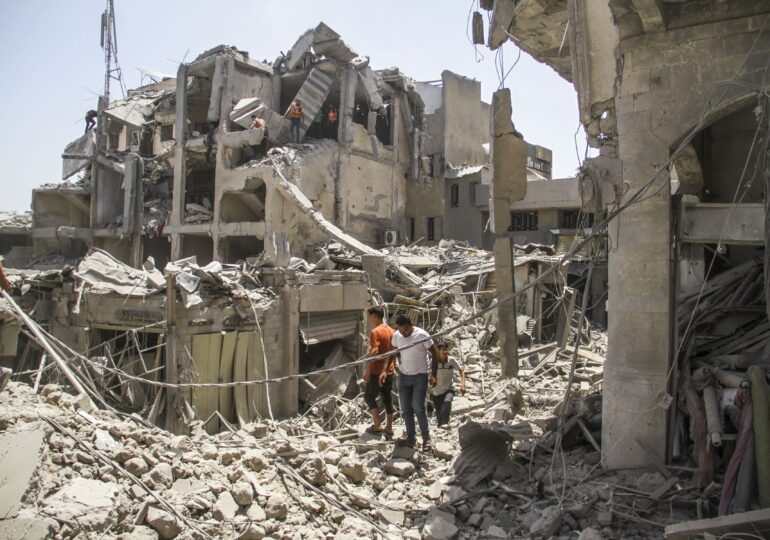The killing and massacre of innocent people are unacceptable. So why are they allowed to continue? The answer is moral relativism.
Seeking peace in major conflicts is often seemingly futile. In Gaza, discussions about ceasefires, armistices, and pauses usually end in tears.
In Ukraine, the war has entered its fourth year without an end in sight, despite Donald Trump's new 50-day deadline. Syria is burning again. The horrors of Sudan never cease. Last year, state conflicts reached a peak - 61 in 36 countries. It was the highest number recorded since 1946. This year could be worse, writes Simon Tisdall, an analyst of foreign policy, in The Guardian.
The scale of war crimes and other atrocities in conflict zones is indescribable. Deliberate and illegal terrorizing of civilians, killing, mutilation, and abduction of children, as well as the use of starvation, sexual violence, torture, and forced displacement as weapons of war have become almost routine.
The killing by Israel of children waiting in line for water in Gaza last week was shocking, especially since scenes like this have become so common.
"Blessed are the peacemakers," said Saint Matthew, but today, impartial mediators are extremely few.
Surely everyone agrees: killing and massacring the innocent are unacceptable. So why the hell are they allowed to continue? The same question is loudly cried out by grieving parents from Rafah, Kiev, and Darfur, by UN humanitarian workers, in Parliaments, in street protests. Why? WHY?
The Curse of Moral Relativism
The curse of moral relativism offers a clue. The truth is not everyone agrees. What is absolutely immoral for one group of people is relatively permissible or justifiable for another. This has been true throughout human history. However, today's world, geopolitically and economically divided, is also ethically and morally fractured to a possibly unprecedented extent. Agreed standards, respected - what American writer David Brooks calls a "permanent moral order" - are missing.
The collapse of the rules-based international order is reflected in this crisis of moral order. Without universally accepted principles, peaceful resolution of conflicts, external or internal, becomes extremely problematic.
"We have no objective standard by which to determine that one view is correct and another is wrong. Therefore, public arguments continue endlessly, at higher levels of outrage and polarization," says Brooks. What remains is coercion and manipulation.
Trump, the Master Manipulator
No one embodies better the moral-relativist confusion permeating contemporary life than Trump, the master manipulator. He believes, for example, that he deserves the Nobel Peace Prize for 2025. Yet, Trump, in complicity with Israel, recently bombed Iran and killed numerous civilians. In his morally confused view, that illegal act of aggression was justified because it restored the peace he had just broken.
In a world entangled in war, the venerable Nobel Peace Prize awarded by Alfred Nobel seems increasingly anachronistic – and politicized. Barack Obama won it in 2009 for doing nothing. Worse, Trump was nominated by Benjamin Netanyahu, the ultimate enemy of peace and morality in Israel.
Making a moral argument in favor of peace can be confusing, even controversial; ask any church or mosque leader. For many people, it seems, morality is a dirty word these days. It's primarily a matter of individual choice and cultural belonging, not duty, obligation, or fidelity to a higher law.
How else could it be explained why so many Americans turn a blind eye to Trump's astonishingly immoral act, exemplified by the Jeffrey Epstein affair?
People Can Choose Their Own Moral Battles
A large part of the Russian public suffers from chronic moral deficiency when contemplating the devastation of Ukraine by Vladimir Putin. Intimidated dissidents avoid the subject. Others believe in the fairy tales of disinformation woven by the regime-controlled media.
Most live in a state of profound ignorance about the crimes committed in their name. When it ends, Russians may argue, like Germans in 1945, that they didn't know. Immorality is mitigated by lies.
Denying peace in Palestine by Israel comes with a high moral cost. Its reputation is shattered, and its prime minister has an arrest warrant issued against him for war crimes. Antisemitism is on the rise internationally as a direct consequence. How can so many Israelis live with their army's assault on Gaza, under the specter of 58,000 corpses?
Ordinary people, in ordinary times, can choose their own moral battles. But ending major conflicts and alleviating the suffering of millions of people is a moral imperative that demands a resolute collective response from all those involved. This is the path to peace. This is the path to salvation, concludes Simon Tisdall.

